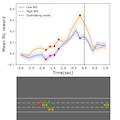Abstract
A major challenge in assessing psychological constructs such as impulsivity is the weak correlation between self-report and behavioral task measures that are supposed to assess the same construct. To address this issue, we developed a real-time driving task called the “highway task,” in which participants often exhibit impulsive behaviors mirroring real- life impulsive traits captured by self-report questionnaires. Here, we show that a self-report measure of impulsivity is highly correlated with performance in the highway task but not with traditional behavioral task measures of impulsivity (47 adults aged 18–33 years). By integrating deep neural networks with an inverse reinforcement learning (IRL) algorithm, we inferred dynamic changes of subjective rewards during the highway task. The results indicated that impulsive participants attribute high subjective rewards to irrational or risky situations. Overall, our results suggest that using real-time tasks combined with IRL can help reconcile the discrepancy between self-report and behavioral task measures of psychological constructs.
